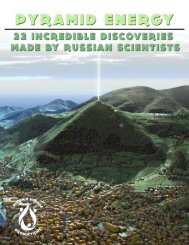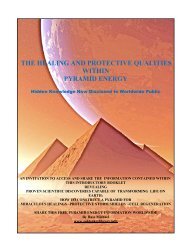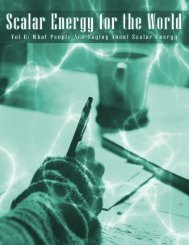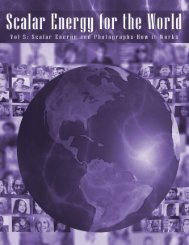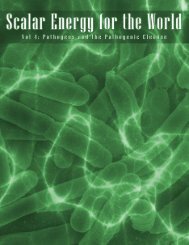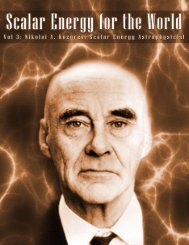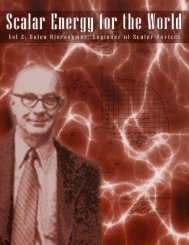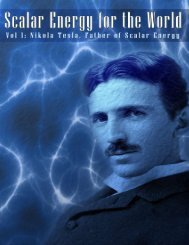Gallery of Clean Energy Inventions Exhibit - with setup details
The Gallery of Clean Energy Inventions Exhibit exhibits 45 generators, 23 advanced self-powered electric vehicle innovations, 27 radioactivity neutralization methods, 25 space travel innovations, 20 technical solutions to water shortages, and a torsion field school network. The exhibit also includes 26 movie posters and 98 fantastically colorful Hubble Space Telescope images. The exhibit can be installed in conventions, festivals, and any suitable public buildings such as universities, city halls, museums, shopping malls, and libraries.
The Gallery of Clean Energy Inventions Exhibit exhibits 45 generators, 23 advanced self-powered electric vehicle innovations, 27 radioactivity neutralization methods, 25 space travel innovations, 20 technical solutions to water shortages, and a torsion field school network. The exhibit also includes 26 movie posters and 98 fantastically colorful Hubble Space Telescope images. The exhibit can be installed in conventions, festivals, and any suitable public buildings such as universities, city halls, museums, shopping malls, and libraries.
Create successful ePaper yourself
Turn your PDF publications into a flip-book with our unique Google optimized e-Paper software.
As for the newly established higher acceptable Japanese limit for radiation: “This is<br />
not only unscientific, it is also unconscionable,” Dr. Fairlie, Unspoken Death Toll <strong>of</strong><br />
Fukushima: Nuclear Disaster Killing Japanese Slowly, Sputnik International, Aug. 8,<br />
2015. After all, on a factual basis, “unscientific and unconscionable” are strong<br />
indictments.<br />
Yet, the Olympic committee has already approved Tokyo 2020, and people from<br />
around the world will be making plans to attend. Withal, if the Olympic Committee is<br />
okay <strong>with</strong> Japan’s capricious radiation conditions, then shouldn’t everybody else be<br />
okay <strong>with</strong> it too? Well….<br />
All <strong>of</strong> which brings to mind: If Fukushima’s a canary in the mineshaft that exposes<br />
nuclear power’s hidden dirty underbelly, meaning, once things go wrong they really<br />
go wrong, adhering to Murphy’s Law, then what <strong>of</strong> the potential consequences <strong>of</strong> big<br />
ole nuke plants in war zones? How would Murphy’s Law apply in a war zone? The<br />
most comfortable answer is: Don’t even think about it.<br />
Still, the world’s 430 nuclear reactors are “big fat sitting ducks.” According to former<br />
ambassador Murata, nuclear reactors are “the world’s most serious security problem.”<br />
Thus, Fukushima may be more than the poster child <strong>of</strong> nuclear power’s fragility vis<br />
a vis extreme forces <strong>of</strong> nature; it’s also a surrogate poster child for lurking dangers<br />
behind and <strong>with</strong>in terrorism and <strong>with</strong>in war zones when “anything that can go wrong<br />
will go wrong,” for example, a downed airliner over Ukraine.<br />
Nuclear Reactors are as Dangerous as Nuclear Weapons (Murata)<br />
Rockets have been fired at nuclear facilities in Israel. “Hamas claimed responsibility for<br />
the rockets, stating that it had been attempting to hit the nuclear reactor. Militants from<br />
Hamas’s Qassam Brigades said they had launched long-range M-75 rockets towards<br />
Dimona” (The Jerusalem Post, July 9, 2014).<br />
As mentioned earlier, Ukraine is home to 15 nuclear reactors in the midst <strong>of</strong> a war<br />
zone. What if a missile accidentally, or purposefully, hits a nuclear reactor? Does<br />
Fukushima provide any clues as to the consequences <strong>of</strong> such a disaster?<br />
Assuming Fukushima is truly a harbinger <strong>of</strong> how remarkably well nuclear disasters<br />
harmonize <strong>with</strong>, in fact, cohere to Murphy’s Law, it probably implies that “all bets are<br />
<strong>of</strong>f.”



